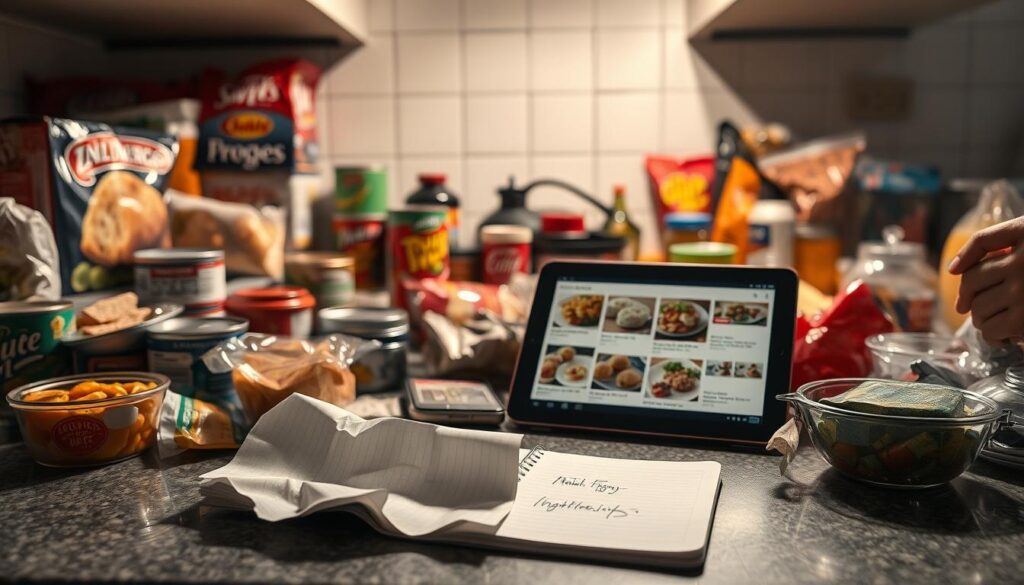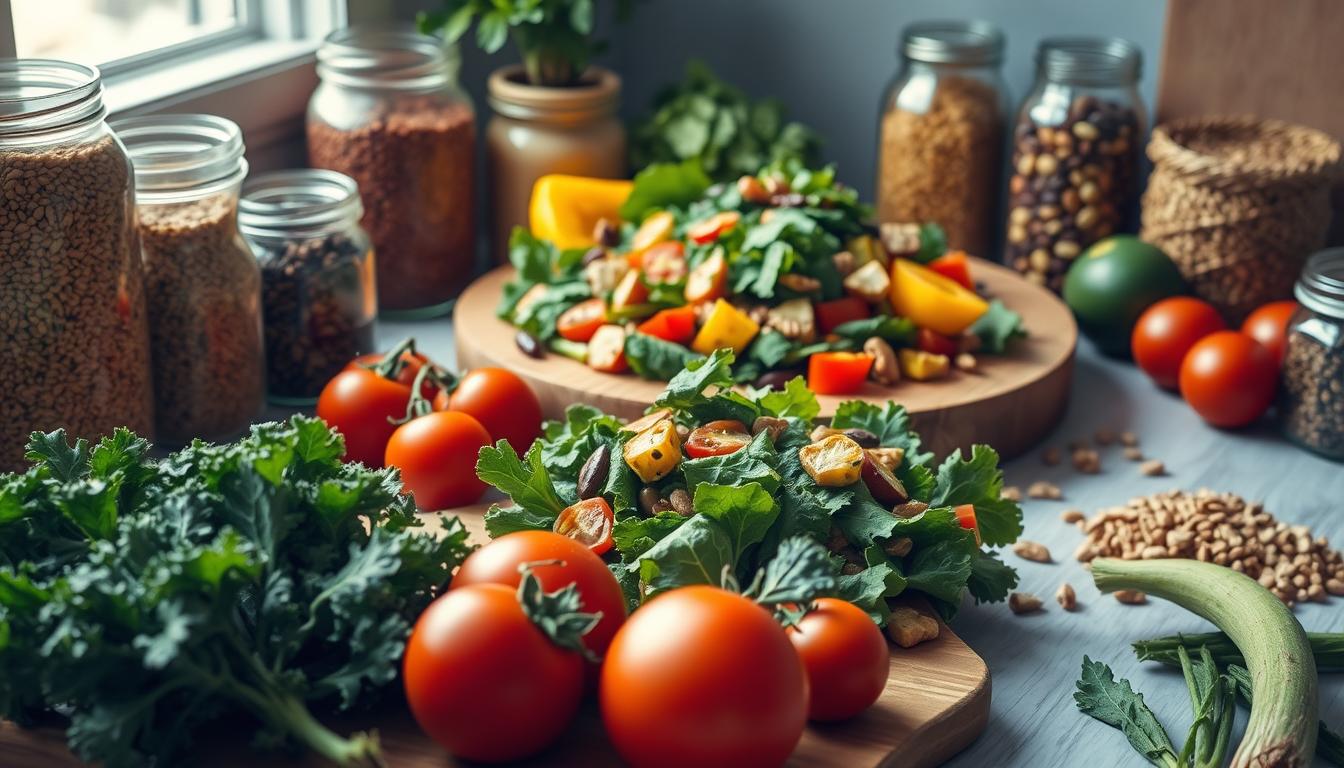Is Meal Prepping Actually Healthy? You’ve probably heard about meal prepping and its growing popularity in health circles. But what is it, and how does it affect your health?
Meal prepping means making your meals ahead of time, often for a whole week. It’s become a key part of many diets. It promises to save time, cut down on food waste, and help you eat healthier.
Thinking about adding meal prepping to your routine? You might be wondering if it’s good for you. In this article, we’ll look at the good and bad sides of meal prepping and how it affects your health.
Contents
- 1 What Is Meal Prepping and Why Is It Popular?
- 2 Is Meal Prepping Actually Healthy? The Science Behind It
- 3 The Health Benefits of Meal Prepping
- 4 Potential Drawbacks and Health Concerns
- 5 Best Practices for Healthy Meal Prepping
- 6 Common Meal Prepping Mistakes to Avoid
- 7 Who Benefits Most from Meal Prepping?
- 8 Conclusion: Is Meal Prepping Actually Healthy?
- 9 FAQ
What Is Meal Prepping and Why Is It Popular?
Preparing meals ahead of time lets people control their nutrition better than ever. Meal prepping means planning and making meals before they’re needed. It can be as simple as setting aside snacks or as complex as cooking for a week. This method is gaining fans for its many benefits.
Meal prepping greatly improves meal planning. It helps people eat a balanced diet by planning meals in advance. This way, they avoid unhealthy choices made at the last minute.
Benefits of Meal Prepping
- Improved nutrition through balanced meal planning
- Time savings by reducing daily meal preparation time
- Reduced food waste by planning meals around existing ingredients
- Increased efficiency in grocery shopping
Meal prepping is more than just saving time. It’s about controlling what you eat. By making meals ahead, you can make sure your diet is full of important nutrients. This is especially good for people with special dietary needs or restrictions.
Is Meal Prepping Actually Healthy? The Science Behind It
Meal prepping is more than just cooking ahead. It’s about planning meals to boost your health. By preparing meals early, you can control what you eat and how much.
One big plus of meal prepping is portion control. It helps you eat the right amount, which is key for a healthy weight. It also lowers the risk of diet-related diseases.
It also makes sure you get all the nutrients you need. When you plan meals, you can balance proteins, carbs, and fats. This balance is good for your health and helps avoid nutrient gaps.
Nutritional Benefits of Meal Prepping
Meal prepping can greatly improve your diet. It encourages eating whole foods and balanced meals. This leads to better health and eating habits. Here are some key benefits:
- More fruits and veggies
- More protein for muscle health
- Better carb intake for energy
- Less processed and sugary foods
| Nutritional Aspect | Benefits of Meal Prepping | Impact on Health |
|---|---|---|
| Portion Control | Reduces overeating | Supports weight management |
| Balanced Nutrient Intake | Ensures a mix of proteins, carbs, and fats | Prevents nutrient deficiencies |
| Reduced Processed Foods | Lowers intake of unhealthy foods | Decreases risk of diet-related diseases |
Adding meal prepping to your routine can improve your diet and health. It’s not just about cooking early. It’s about making a healthier food relationship.
The Health Benefits of Meal Prepping
Meal prepping lets you plan and prepare meals ahead of time. This way, you can ensure you eat balanced and healthy meals, even when you’re busy.
Meal prepping helps you make healthier food choices. When you prep meals, you’re less likely to grab fast food or junk snacks. This can improve your health and overall well-being.
Reducing Food Waste
It also helps cut down on food waste. By planning meals, you can make a better grocery list. This means you buy only what you need, saving money and helping the environment.
To see how meal prepping reduces waste, let’s compare:
| Aspect | Without Meal Prepping | With Meal Prepping |
|---|---|---|
| Grocery Shopping | Often results in buying more than needed | Involves making a precise list, reducing excess purchases |
| Food Usage | May lead to expired or spoiled food | Ensures that ingredients are used before they expire |
| Financial Impact | Can result in wasted money due to unused food | Saves money by reducing waste and optimizing purchases |
As the table shows, meal prepping cuts down on waste. It’s a smart move for your wallet and the planet.
- Control how much you eat, which can help with weight
- Make sure you get all the nutrients you need
- Avoid unhealthy choices when you’re in a rush
By starting meal prepping, you’re moving towards a healthier life. It’s a big step towards reaching your health and nutrition goals.
Potential Drawbacks and Health Concerns
Meal prepping can cause health problems if not done right. A big worry is getting too few nutrients if the diet isn’t planned well.
Meal prepping means making meals ahead of time. But, it can lead to eating too much processed food if not done right. It’s key to make sure your meal prep includes lots of whole foods for a balanced diet.

Some common mistakes in meal prepping include not thinking about your nutritional needs. Also, relying too much on one food group and not storing food right. To avoid these mistakes, plan your meals well and think about what you need to eat.
Nutritional Considerations
It’s important to make sure your meal prep is full of nutrients. This means eating a variety of foods from all groups, like fruits, veggies, proteins, and whole grains.
- Plan meals around seasonal produce to ensure freshness and variety.
- Incorporate a mix of protein sources, such as lean meats, fish, and plant-based options.
- Use proper food storage techniques to maintain food safety.
By being aware of these potential issues and taking steps to fix them, you can enjoy meal prepping. You can keep your diet healthy and balanced.
Best Practices for Healthy Meal Prepping
To get the most from meal prepping, it’s key to follow some best practices. This ensures your meals are tasty and healthy. Planning and preparing nutritious meals is at the heart of successful meal prepping.
First, planning meals around fresh, seasonal ingredients is crucial. Varying your meals keeps your diet interesting and balanced. Include different proteins, vegetables, and whole grains in your meals.
Proper storage and reheating techniques are vital. Always store meals in airtight containers. Keep them refrigerated at a temperature below 40°F (4°C).
| Storage Method | Reheating Method | Safety Tip |
|---|---|---|
| Airtight Containers | Microwave | Reheat to 165°F (74°C) |
| Refrigerate at 40°F (4°C) | Oven | Check internal temperature |
| Freeze for longer storage | Stovetop | Avoid overheating |
When reheating, ensure meals reach a safe internal temperature. Label containers with the date they were prepared. This helps track how long they’ve been stored.
By following these best practices, you can enjoy healthy, delicious meals. You’ll also reduce food waste and save time during the week.
Common Meal Prepping Mistakes to Avoid
To make meal prepping a sustainable habit, you need to know the mistakes to avoid. These include overcomplicating your plans and neglecting food safety. Meal prepping is a great way to ensure you’re eating healthy, nutritious meals, but it’s not without its pitfalls.
One of the most significant mistakes you can make is overcomplicating your meal prep plans. Simplifying your meal prep can make it more enjoyable and sustainable. Start by planning meals around a few core ingredients and recipes you enjoy.
Another critical aspect is portion control. It’s easy to overestimate or underestimate the amount of food you need, leading to waste or insufficient meals. Being mindful of your portion sizes can help you save time and money while ensuring you’re fueling your body appropriately.
Not Ignoring Food Safety
Food safety is a crucial consideration when meal prepping. Always handle and store food properly to prevent contamination and foodborne illness. This includes labeling and dating your prepped meals, storing them in airtight containers, and keeping your refrigerator at the correct temperature.
Here are some key food safety tips to keep in mind:
- Label and date all stored meals.
- Store meals in airtight, shallow containers to help them cool faster.
- Reheat meals to the appropriate temperature to ensure food safety.
By avoiding these common meal prepping mistakes and prioritizing food safety, you can make meal prepping a healthy and enjoyable part of your lifestyle.
Who Benefits Most from Meal Prepping?
Meal prepping can be tailored to fit your needs. It’s not for everyone, but it helps many groups a lot.
Busy professionals save time with meal prepping. They get healthy meals without having to cook every day. This is great for those with tight schedules who might eat fast food otherwise.
Fitness Enthusiasts and Meal Prepping
Fitness lovers also gain a lot from meal prepping. It helps them eat the right foods for their goals, like building muscle or losing weight.
Meal prepping lets you control what you eat. This is key for athletes and fitness fans who need specific diets. For example, marathon runners might eat more carbs, while bodybuilders need more protein.
Others who might benefit include those with special diets, like vegans or those who can’t eat gluten. Meal prepping ensures they have food that fits their needs.
Meal prepping can fit many lifestyles and diets. By understanding its benefits and adjusting it to your needs, you can reach your health and fitness goals.
Conclusion: Is Meal Prepping Actually Healthy?
Meal prepping can help you eat healthy and reach your nutrition goals. It’s important to know the good and bad sides. This way, you can make a meal prep plan that fits your life.
To keep meal prepping a part of your life, aim for balance and flexibility. Pay attention to what your body needs and plan your meals wisely. Don’t let meal prep become too strict or overwhelming.
By taking a balanced approach to meal prepping, you can enjoy healthy eating without stress. Remember, the goal is to find a meal prep rhythm that supports your health and wellness goals.
See Also: Tasty Lunchbox Ideas for Picky Eaters
FAQ
What is meal prepping, and how does it work?
Is meal prepping healthy for everyone?
How can meal prepping help with weight loss?
Can meal prepping help reduce food waste?
What are some common meal prepping mistakes to avoid?
How do I store and reheat meal prep safely?

Hi, I’m Waverly Moon, creator of TipsToFeelBetter.com. This blog is for practical moms and family-focused women seeking simple, realistic ways to improve daily life. From home routines to self-care, I share tips that truly work—because life doesn’t need to be perfect to feel better. Let’s make everyday moments a little easier, together.

